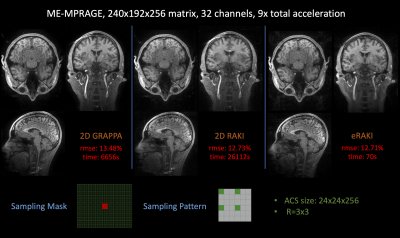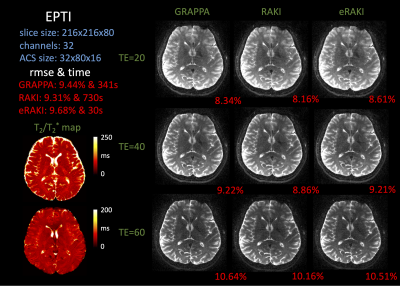Heng Yu1, Zijing Dong2,3, Yamin Arefeen2, Congyu Liao4, Kawin Setsompop4,5, and Berkin Bilgic3,6,7
1Department of Automation, Tsinghua University, Beijing, China, 2Department of Electrical Engineering and Computer Science, Massachusetts Institute of Technology, Cambridge, MA, United States, 3Athinoula A. Martinos Center for Biomedical Imaging, Charlestown, MA, United States, 4Radiological Sciences Laboratory, Stanford University, Stanford, CA, United States, 5Department of Electrical Engineering, Stanford University, Stanford, CA, United States, 6Harvard Medical School, Boston, MA, United States, 7Harvard-MIT Health Sciences and Technology, Massachusetts Institute of Technology, Cambridge, MA, United States
1Department of Automation, Tsinghua University, Beijing, China, 2Department of Electrical Engineering and Computer Science, Massachusetts Institute of Technology, Cambridge, MA, United States, 3Athinoula A. Martinos Center for Biomedical Imaging, Charlestown, MA, United States, 4Radiological Sciences Laboratory, Stanford University, Stanford, CA, United States, 5Department of Electrical Engineering, Stanford University, Stanford, CA, United States, 6Harvard Medical School, Boston, MA, United States, 7Harvard-MIT Health Sciences and Technology, Massachusetts Institute of Technology, Cambridge, MA, United States
Robust Artificial neural networks for K‐space Interpolation (RAKI) can be significantly accelerated using coil combination in 3D k-space. We show improvements in 3D imaging with joint reconstruction and elliptical-CAIPI sampling and rapid EPTI reconstruction.

Comparisons between 2D GRAPPA, 2D RAKI, and eRAKI reconstructions on 3D ME-MPRAGE data using 24×24×256 ACS and 3×3 undersampling. We use Tikhonov regularization in GRAPPA and set parameter λ=1×e-9. Our eRAKI benefits from 3D convolutions and can achieve comparable performance with high-speed reconstruction.
